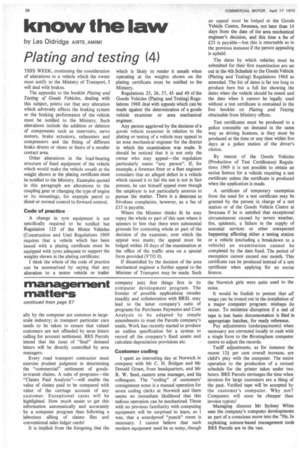know the law
Page 60

If you've noticed an error in this article please click here to report it so we can fix it.
by Les Oldridge AIRTE, AMIMI
Plating and testing (4)
THIS WEEK, continuing the consideration of alterations to a vehicle which the owner must notify to the Ministry of Transport, I will deal with brakes.
The appendix to the booklet Plating and Testing of Goods Vehicles, dealing with this subject, points out that any alteration which adversely affects the braking system or the braking performance of the vehicle must be notified to the Ministry. Such alterations include the addition or deletion of components such as reservoirs, servo motors, brake actuators, exhausters and compressors and the fitting of different brake drums or shoes or liners of a smaller contact area.
Other alterations in the load-bearing structure of fixed equipment of the vehicle which would make the vehicle unsafe at the weight shown in the plating certificate must be notified to the Ministry. Examples quoted in this paragraph are alterations to the coupling gear or changing the type of engine or its mountings, for example petrol to diesel or normal control to forward control.
Code of practice
A change in tyre equipment is not specifically required to be notified but Regulation 125 of the Motor Vehicles (Construction and Use) Regulations 1969 requires that a vehicle which has been issued with a plating certificate must be equipped with tyres adequate to support the weights shown in the plating certificate. think the whole of the code of practice can be summarized by saying that any alteration to a motor vehicle or trailer which is likely to render it unsafe when operating at the weights shown on the plating certificate must be notified to the Ministry.
Regulations 25, 26, 37, 45 and 49 of the Goods Vehicles (Plating and Testing) Regulations 1968 deal with appeals which can be made against the determination of a goods vehicle examiner or area mechanical engineer.
Any person aggrieved by the decision of a goods vehicle examiner in relation to the plating or testing of a vehicle may appeal to an area mechanical engineer for the district in which the examination was made. It should be noticed that it is not only the owner who may appeal—the regulation particularly states "any person". If, for example, a foreman fitter or a fleet engineer considers that an alleged defect in a vehicle which caused it to fail the test is not in fact present, he can himself appeal even though the employer is not particularly anxious to pursue the matter. There is a deterrent to frivolous complaints, however, as a fee of £15 is payable.
Where the Minister thinks fit he may repay the whole or part of this sum where it appears to him that there were substantial grounds for contesting whole or part of the decision of the examiner, over which the appeal was made; the appeal must be lodged within 10 days of the examination at the office of the traffic area on a special form provided (VTG 8).
If dissatisfied by the decision of the area mechanical engineer a further appeal to the Minister of Transport may be made. Such an appeal must be lodged at the Goods Vehicle Centre, Swansea, not later than 14 days from the date of the area mechanical engineer's decision, and this time a fee of £25 is payable—but this is returnable as in the previous instance if the person appealing is upheld.
The dates by which vehicles must be submitted for their first examination are set out in the 4th Schedule to the Goods Vehicle (Plating and Testing) Regulations 1968 as amended. The list of dates is far too long to produce here but a full list showing the dates when the vehicle should be tested and the date when it cannot be legally used without a test certificate is contained in the free booklet on Plating and Testing obtainable from Ministry offices.
Test certificates must be produced to a police constable on demand in the same way as driving licences, ie they must be produced at the time or any time within five days at a police station of the driver's choice.
By reason of the Goods Vehicles (Production of Test Certificates) Regulations 1969 it is not possible to obtain an excise licence for a vehicle requiring a test certificate unless the certificate is produced when the application is made.
A certificate of temporary exemption from the need for a test certificate may be granted by the person in charge of a test station or of the Goods Vehicle Centre at Swansea if he is satisfied that exceptional circumstances caused by severe weather, fire, epidemic, a failure in the supply of essential services or other unexpected happening affecting either a testing station or a vehicle (excluding a breakdown to a vehicle) an examination cannot be completed by the date fixed. The period of exemption cannot exceed one month. This certificate can be produced instead of a test certificate when applying for an excise licence.












































































































